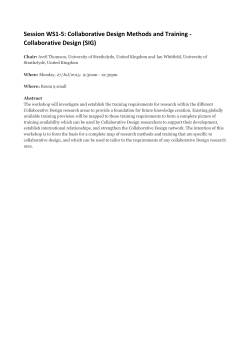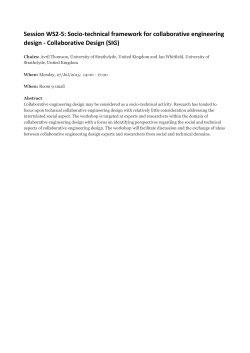
Darren Nichols Resume - The William D. Ruckelshaus Center
WASHINGTON STATE UNIVERSITY WILLIAM D. RUCKELSHAUS CENTER THE UNIVERSITY OF WASHINGTON Darren Nichols Associate Director Darren brings 12 years of public policy, land use planning and community development experience, including local, state and regional agency management experience. Prior to joining the Center, he served as Executive Director of the Columbia River Gorge Commission, a unique interstate compact agency between Oregon and Washington that was established by act of Congress to protect and enhance the scenic, cultural, recreational, economic and natural resources of the Columbia River Gorge, and involves While at the Commission, he worked closely with the bi-state regional community (two states, six counties, 13 urban and rural communities, four tribal governments, federal agencies and numerous other stakeholders and involved parties) to foster a collaborative dialogue about regional priorities and long-term stewardship of resources and communities. Darren has also worked with the White House Council on Environmental Quality, and served as a senior division manager and regional planner with the Oregon Department of Land Conservation and Development. KEYS AREAS OF EXPERTISE: Interagency Collaboration Policy Development Land Use Planning Community Development Urban & Regional Planning Rural Economic Development Legislative Relations Tribal Government-to-Government Consultation State and Interstate Agency Management Grant Program Management Community Engagement/Public Involvement Law and Policy PROFESSIONAL AFFILIATIONS: Association for Conflict Resolution - Environment and Public Policy Section American Planning Association American Bar Association - Alternative Dispute Resolution Section University Network for Collaborative Governance EDUCATION AND TRAINING Lewis & Clark Law School, JD, Environmental and Natural Resource Law (anticipated 2015) Portland State University, MURP, College of Urban and Public Affairs – School of Urban Studies and Planning 2005 Willamette University, BS, Business Economics 1995 Pacific Program for Catalytic Leadership 2007 Selected Project Experience Columbia River Gorge National Scenic Area, 2012 to 2015: Darren directed the Gorge Commission’s work with neutral facilitators and a wide range of diverse interests to assess regional priorities and identify areas of shared interest for collaborative regional planning and policy. Through Darren’s leadership, the Commission worked closely with Oregon Consensus and the Ruckelshaus Center to reshape 25 years of internal and external contention into a constructive, forwardlooking discussion about the long term health of Gorge resources and the long-term future of Gorge communities. The Commission is now using collaborative training tools to improve internal relations and to strengthen its role as a collaborative regional planning agency. Collaborative Public Planning, 2007 to 2011: As the grants program manager for Oregon’s Department of Land Conservation and Development (DLCD), Darren worked with the Land Conservation and Development Commission’s (LCDC) grants advisory committee and with Oregon Consensus to increase funding for land use mediation services and produced a documentary video outlining a model public policy collaborative between ranchers, public agencies and environmental interests in Malheur County, Oregon. The video and the department’s investment in alternative dispute resolution tools informs and supports collaborative local and regional decision-makers across the state. Information for Collaborative Decision Making, 2006 to present: Darren is committed to providing better information and innovative tools to help public and private decision-makers at all levels. During his tenure with the State of Oregon, Darren helped the department design and invest in an Information Management Modernization Initiative – a system of organizing and storing forty years of statewide natural resource, land use, conservation, community development, and infrastructure planning data in a publicly accessible library. The land use data will help current and future citizens, agency managers and elected officials make more informed (and hopefully more collaborative) decisions about the future of Oregon’s natural resources and communities. William D. Ruckelshaus Center • RuckelshausCenter@wsu.edu PO Box 646248 • Pullman, WA 99164-6248 • (509)335-2937 • 901 Fifth Avenue, Suite 2900 • Seattle, WA 98164-2040 • (206)428-3021 Selected Project Experience, continued Interagency Technology, Science and Policy Partnerships, 2012 to 2015: Under Darren’s leadership, the Gorge Commission and several partner organizations advanced the collaborative effectiveness of NW state and federal agencies through strategic partnerships with interdisciplinary monitoring, data management, science, and policy organizations. Darren convened colleagues at Washington State University’s School of the Environment, Portland State University’s School of the Environment, Oregon State University’s College of Forestry, the United States Geological Survey, United States Department of Energy, the United States Forest Service and others to jointly develop a shared information system concept. The resulting “decision support framework” is intended to collect monitoring data and apply scientific analyses from multiple agencies, and then feed that shared information into a collaborative planning and policy decision-making framework for the bi-state Columbia River Gorge National Scenic Area. The decision support framework may serve as a model for other agencies and regions interested in working together on collaborative public policy. Ultimately, the framework may serve as a model to inform the next generation of national environmental policy, incorporating consistent information and science into local, state and regional decisions as well as federal agency decisions. Administrative Assessment, 2014: Worked with the Evans School of Public Affairs (University of Washington) and the Hatfield School of Government – Center for Public Service (Portland State University) to conduct a first-ever agency assessment of the Columbia River Gorge Commission. The assessment identified administrative opportunities and constraints, unique legal tools, and national comparisons to provide a series of recommendations for the future stability of the agency and the Columbia River Gorge National Scenic Area. William D. Ruckelshaus Center 121 Hulbert Hall PO Box 646248 Pullman, WA 99164-6248 901 Fifth Avenue Suite 2900 Seattle, WA 98164-2040 (509) 335-2937 (206) 428-3021 RuckelshausCenter@wsu.edu 4/28/15
© Copyright 2025









